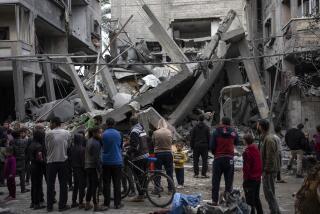U.N. Demands Yemen Halt Attack on Rebel City Aden : Mideast: Civilian casualties, water shortages prompt Security Council to urge a cease-fire.
UNITED NATIONS — Alarmed by reports of heavy civilian casualties and dangerous shortages of water, the U.N. Security Council demanded Wednesday that the government of Yemen halt its offensive against the main rebel city of Aden on the edge of the Arabian Peninsula.
But the Security Council, in a resolution approved unanimously, took no action to punish the government of Yemen or to attempt to stop the 2-month-old civil war by force.
Instead, the ambassadors urged both sides to sign a cease-fire, accept international observers to monitor it and begin talks to settle their differences peacefully.
The council seemed most concerned about the fate of Aden, the largest city in southern Yemen.
“The military assault on Aden continues,” said Madeleine Albright, U.S. ambassador to the United Nations. “We are alarmed by reports of a northern ground offensive, renewed shelling of civilian areas and heavy casualties. We are further alarmed by the humanitarian situation in Yemen, including the interruption of water supplies to Aden and the potential outbreak of disease.”
North and South Yemen united into a single state in 1990. But the union has been a difficult one, with leaders of the less populous south, which had been a Marxist state, accusing the other Yemeni leaders of repression.
The southern leaders proclaimed secession in late April, and the civil war began.
Yemeni President Ali Abdullah Saleh has vowed to seize Aden, a famous port of call during the days of the British Empire. His heavy weapons have the city of 250,000 in range, and U.N. Secretary General Boutros Boutros-Ghali reported to the council Wednesday that “a major crisis is imminent unless a political solution is found, or at least a cease-fire is put into force as soon as possible.”
A special U.N. envoy, Lakhdar Brahimi, a former Algerian foreign minister, has tried to negotiate a truce, meeting with both sides in Yemen and at U.N. headquarters in New York.
Just before the vote, in fact, a southern Yemen representative pledged to Brahimi that the secessionists would respect a 48-hour cease-fire called for by the International Committee of the Red Cross to let relief supplies into Aden.
But, as British Ambassador David Hannay told the Security Council, “so many cease-fires have been proclaimed and quickly abandoned” since the fighting began.
In the negotiations, Brahimi has found that the two sides cannot agree on the nationalities of the observers who would monitor a cease-fire. The government at first resisted any observers at all.
In addition, the White House, which is attempting to limit peacekeeping operations, did not want a standard U.N. force.
In light of these objections, the resolution leaves the makeup of the observer force somewhat vague, not even calling it a force but only a “mechanism.”
Ambassador Albright made it clear that the United States does not want the Yemeni mission to be paid for as a regular U.N. peacekeeping operation.
The U.S. government pays almost a third of peacekeeping budgets.
She said “those nations closest to the conflict in Yemen have the greatest stake in resolving this conflict” and that the United States looks to them “and others who might be interested to offer on a voluntary basis the resources needed to implement a mechanism that would supervise a cease-fire.” She evidently had Saudi Arabia, which dominates the peninsula, in mind as the main contributor.
More to Read
Sign up for Essential California
The most important California stories and recommendations in your inbox every morning.
You may occasionally receive promotional content from the Los Angeles Times.










